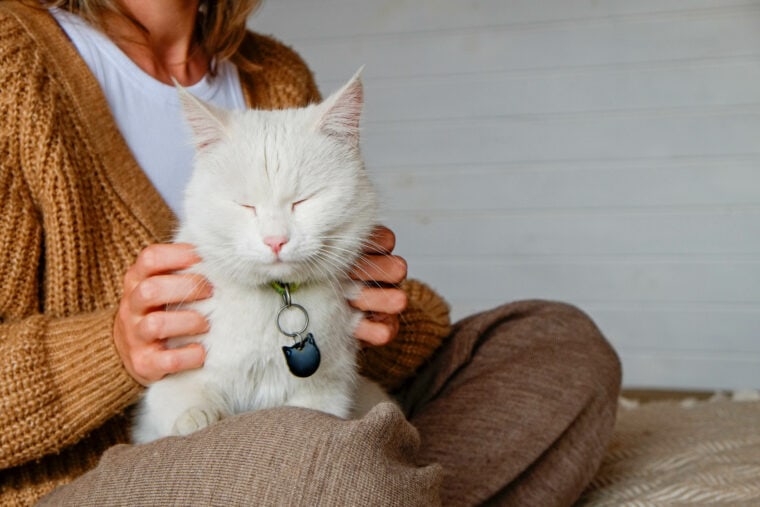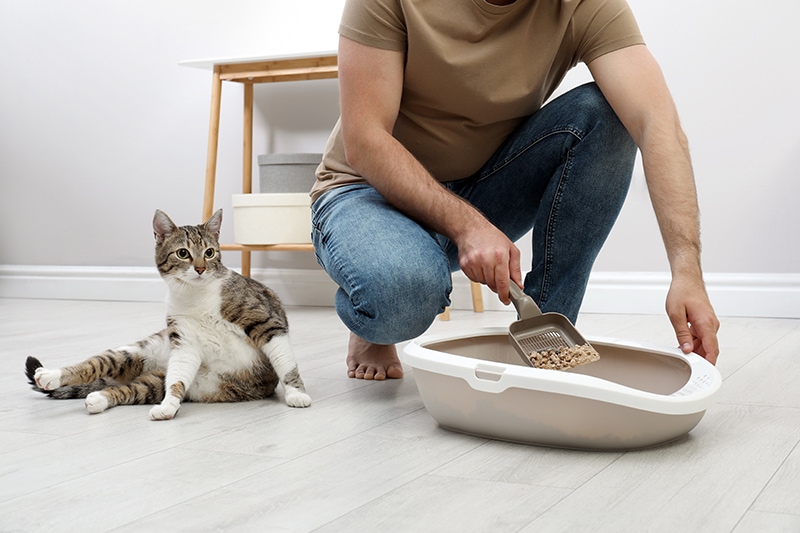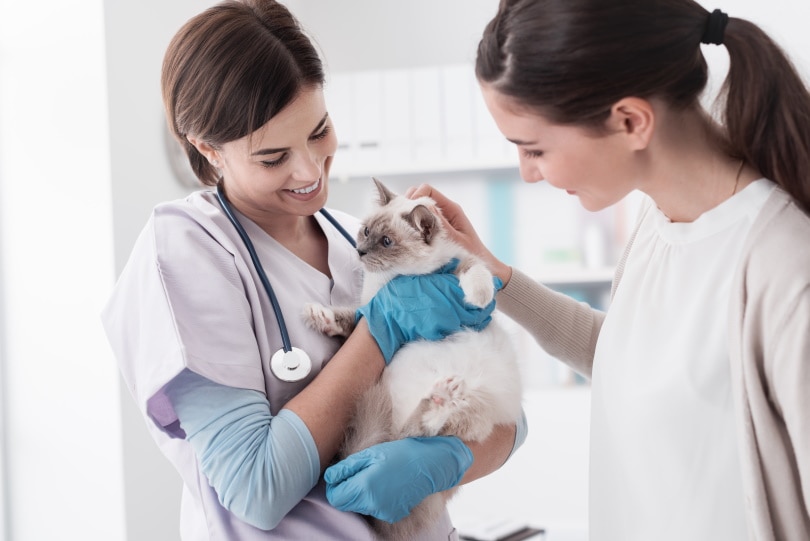
As a cat owner, there’s nothing more unpleasant than the wretched look and smell of cat diarrhea. You know that your cat’s poop already smells bad, but diarrhea is way worse! If you’ve been lucky, you haven’t had to deal with cat diarrhea at all, but sooner or later, you probably will.
We’ll cover the topic of cat diarrhea here, including what causes it and some solutions you can take for remedying the problem. But first, we’ll cover what diarrhea is so you know what you’re dealing with.
What Is Diarrhea In Cats?
Diarrhea is non-formed, loose, or liquidy stool, and it has a strong odor. You probably know how your cat’s regular poop smells and it’s likely you find it unpleasant. Diarrhea smells much worse, and it makes a big mess. It’s a common condition that can be caused by stress, diet change, or a health problem of some sort.
Just as humans can become dehydrated and develop electrolyte imbalances when they have diarrhea, so can cats. That’s why you need to know when to seek help from your vet or treat your cat at home.

Causes of Cat Diarrhea
Diarrhea is relatively common in cats, and there are many reasons why cats get diarrhea. Diarrhea can happen one time and then go away; it can last for days, or weeks, or occur regularly—it all depends on what is causing it.
When your cat’s feces move through his intestines faster than normal, less water, nutrients, and electrolytes are absorbed, resulting in loose, watery stools or diarrhea.
When to Call Your Vet
If your cat has diarrhea just once and that’s it, there’s no need for intervention. But if he has recurring diarrhea that lasts more than a couple of days, you should intervene.
You should contact your vet immediately if you spot blood in the diarrhea or if the diarrhea is accompanied by a fever, lethargy, vomiting, or a complete loss of appetite.

What Your Vet Will Do
Your vet will likely ask you to bring a fresh stool sample to your appointment.
You can expect to be asked to describe your cat’s diarrhea and how often he has it. Your vet will also want to know about any behavioral changes you’ve noticed so be ready to answer lots of questions.
Once he’s asked you a series of questions and has examined your cat, your vet may recommend some diagnostic tests that could include blood work, rectal swab samples for parasite examination, X-rays or abdominal ultrasound. It all depends on what your vet discovers during the clinical exam and how often your cat has diarrhea, along with other symptoms he may be showing.
Possible Treatments Your Vet May Recommend
Your vet may prescribe a medication like prednisolone to control intestinal inflammation. He may tell you that your cat needs to eat a special diet if he thinks the diarrhea is caused by a food intolerance or allergy, inflammatory bowel disease, or colitis.
If your vet discovers that your cat has intestinal parasites, he may give you some deworming medication to give your cat. Because probiotic supplements are often used to treat cats with diarrhea, your vet may recommend one.
What You Can Do
There are some things you can do to help prevent your cat from getting diarrhea. If your vet suspects the diarrhea is caused by a poor diet, buy good-quality cat food. A cat food containing probiotics is a good choice for a cat that has occasional bouts of diarrhea. If you’re unsure of what food to buy your cat, ask your vet for a recommendation.
Dealing with messy diarrhea is never fun. In fact, it’s downright disgusting! If you’re using a regular litter box, switch to a high-sided litter box instead. A box with high sides will prevent diarrhea (and regular cat poop) from getting on your floor and walls. It will also keep the litter in the box where it belongs.
Many cats with diarrhea run fevers, so check your cat’s temp anytime he’s having diarrhea. Get yourself a digital thermometer so you can take your cat’s temperature when you suspect he has a fever. The normal body temperature of a cat is 100.4º to 102.5ºF. Anything above 106º F is cause for alarm, so contact your vet if your cat’s body temp is much higher than normal.
Summary
If your cat gets diarrhea now and then and is showing no other symptoms, you don’t have to worry. But if your cat is experiencing regular diarrhea and has some symptoms like fever, looking lethargic, and lack of appetite, you need to act fast.
Get your cat in to see the vet ASAP so you can get to the bottom of why he has diarrhea. With any luck, it’s nothing serious and a problem that shouldn’t reappear often!
See also:
- My Cat Has Worms: How Do I Clean My House? Vet Approved Advice
- Pancreatic Cancer in Cats (Vet Answer) – Signs, Symptoms & Care
Featured Image Credit: evrymmnt, Shutterstock








